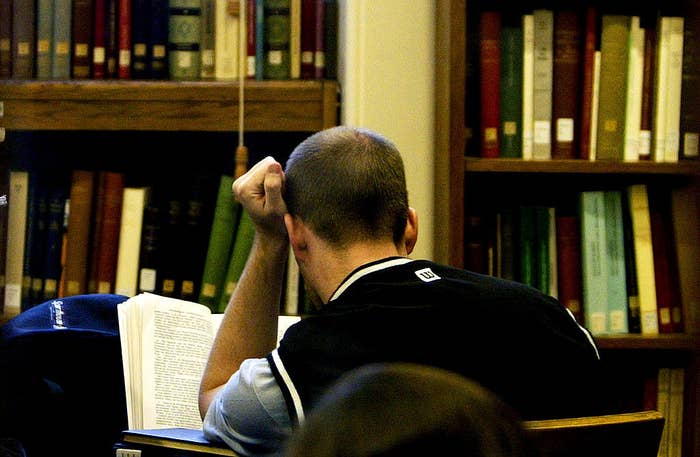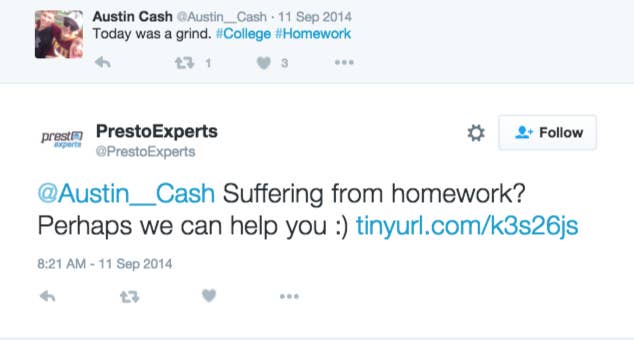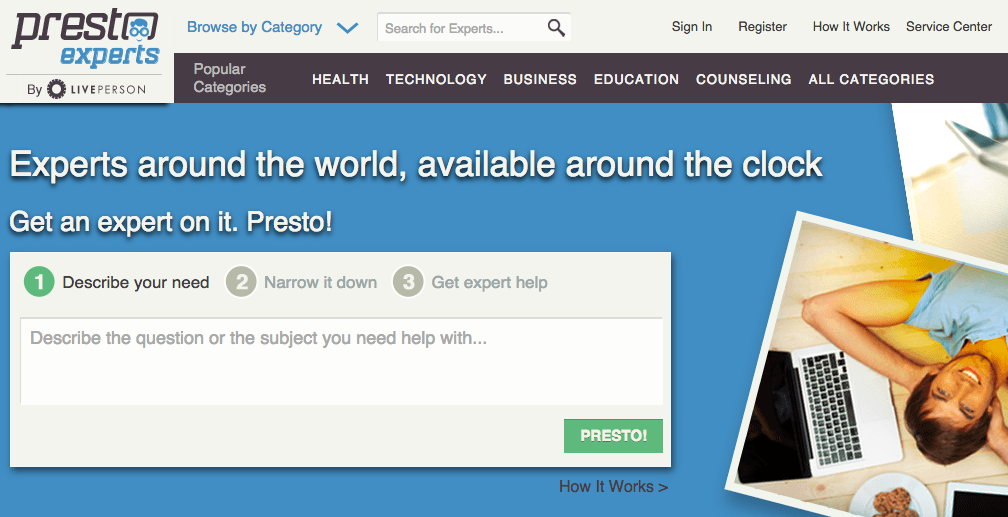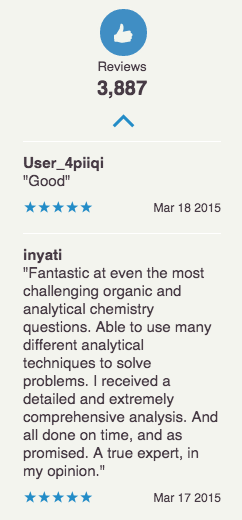
One day in September 2014, a college student in Duluth, Minnesota, sent out a simple tweet, alluding to a sense of weariness no doubt felt by thousands of other hardworking students across the country: “Today was a grind. #College #Homework.”
The student then received a courteous reply from a Twitter account named @PrestoExperts:

The link led to a page filled with academic expert profiles, with names like “The Mentor,” “Mentor Guru,” and “Caring Tutor.” A banner atop the page said: "We offer online homework help of the highest quality…Get your assignments completed accurately and on time. Achieve the grades you need to pass that class!"
PrestoExperts is an online expert marketplace. The site has more than 30,000 independent freelancers who provide 24/7 advice in a variety of categories beyond just education: There are registered experts in counseling, health, law, technology, and finance.
The site launched in 2014 and is owned by LivePerson, Inc., a public New York–based technology company that specializes in “online engagement solutions.” (If you ever visit a retail website and a chat box pops up asking if you need help, that’s probably a LivePerson innovation.) LivePerson generated about $239 million in revenue from its combined businesses in 2015. Roughly 8% of revenue in 2014 came from a segment called consumer services that includes sites like PrestoExperts.
There are plenty of freelancers on PrestoExperts — in particular the health counselors — who provide a valuable service. But much of the site’s online marketing is directed toward an audience of stressed-out college students, many of whom seem to be using it to engage in academic fraud.
The site’s Facebook page contains messages like “The end is near. Make sure you pass all of your classes with our certified experts." Another says: “When coffee stops working for you, we’re here to take over.”
How exactly does a tutor “take over” your work?
One promotional page for science tutors featured some recently asked questions, including the following plea: “HEEELLPPPP I'm in the middle of a physics course and I just don't have time to do the work. Can someone do it for me?”
Upon visiting the PrestoExperts homepage, visitors are asked to enter their request into a blank box. “When you need help with a chemistry paper, you just type in: ‘I need help with my chemistry paper,’” a tutorial says. “You then pick category ‘Education,’ then subcategory ‘Chemistry,’ then fill in the details when prompted. Before you know it, Experts are competing to help you. Presto!”

These requests are sent to a public board, at which point the experts offer competing bids in the hope of being selected for the assignment. Many will take a job for a $20 to $50 fee.
Every public board request is assigned a unique URL, and these posts can be viewed by anyone who types in the URL. For instance, on March 11, 2015, a client posted the following request regarding the midterm exam from an engineering class at San Francisco State University:
“Hello, I need someone to solve this assignment for me asap and it's due in 1.5 hrs at 4:30pm PST/7:30pmEST. I am willing to pay $200. The class is linear systems analysis. The expert should be comfortable in circuits and physics and differential equations… There are 5 problems total.”
The ID number for that request was 958155. The client received 23 eager offers from registered experts.
Just because someone uploaded a midterm and offered $200 for answers doesn’t prove cheating occurred in this instance; there’s no way to tell if the prospective client wound up paying any of the experts. However, a manual review of more than 1,000 public board postings gives the impression that many students are visiting PrestoExperts to engage in "contract cheating."
The term "contract cheating" was coined by Birmingham City University lecturer Thomas Lancaster and his colleague Robert Clarke. They define it as “the form of academic dishonesty where students get academic work completed on their behalf, which they then submit for academic credit as if they had created it themselves. Often contract cheating involves the payment of a fee to a third party, who then creates the work for the student.”
It might mean paying for a custom-written essay — often from an online essay mill — or paying someone to solve an online exam. Between 2005 and 2015, Lancaster and Clarke compiled a database of over 19,000 attempts at contract cheating.

This problem has existed for decades. In 1972, the State of New York dissolved an entity called Termpapers Inc., which produced custom-written essays for $3.85 per page. Termpapers Inc. defended its practice by claiming it provided a similar service as the Encyclopedia Britannica.
The court disagreed. “The business defendants are conducting is morally wrong,” the ruling read. “It subverts the learning process and encourages intellectual dishonesty and cheating. It is directly opposed to the declared public policy of our State.”
The internet has brought along a flood of websites that operate similar to Termpapers Inc. In 2010, a veteran of the essay-mill industry named David Tomar described how he earned roughly $66,000 a year cranking out essays on every subject imaginable — from sociology to nursing to business ethics. In a follow-up piece, Tomar compiled a list of 325 operational ghostwriting services and paper mills. He also explained how essay mills typically avoid legal repercussions with a disclaimer stating any assignments produced by ghostwriters are “homework aids” or “study guides,” and are not meant to be submitted to a class.
A lot of the major essay mills and auction sites are located outside the United States. EssayBay, one of the sites studied in depth by Lancaster and Clarke, is based in the U.K. So is All Answers, an organization that allegedly produced 11,470 custom essays in 2012 alone. CustomEssay.com is based in Toronto. AffordablePapers.com is based in London. UnemployedProfessors.com is based in Montreal. Auction site Rentacoder.com — the subject of a 2008 Guardian article — was purchased by the New Zealand–based company Freelancer.com. In a sweeping essay for the Chronicle of Higher Education, Thomas Bartlett sought out the location of a paper mill called Essay Writers; the trail led to offices in Ukraine and the Philippines.
In the U.S., many states have codes or statutes to prevent plagiarism and academic fraud. Section 213-b of the New York Education Law states: "No person shall, for financial consideration, or the promise of financial consideration, prepare, offer to prepare, cause to be prepared, sell or offer for sale to any person any written material which the seller knows, is informed or has reason to believe is intended for submission as a dissertation, thesis, term paper, essay, report or other written assignment by a student in a university, college, academy, school or other educational institution."
When I reached out to some experts at PrestoExperts.com, they told me the site underwent some changes during the spring, apparently in response to concerns about contract cheating. On March 16, 2015, one of the commenters in the members-only Experts Forum shared the following email from Service & Support:
Dear Experts,
It has come to our attention that some expert profiles include offers of custom or pre-written essays, term papers, and dissertations, as well as other academic papers…According to our policy it is forbidden to suggest these services in your profile, brief description, or expert screen name!...Please verify that your profile, brief description, or expert screen name doesn't clearly state you will do homework or school work of any kind…. Any profile that violates these guidelines will be rejected by 6pm (IST) Sunday, March 22nd.
Using snapshots of old pages preserved at Archive.org, it’s possible to see how profiles changed in the wake of that email. For example, an expert named Pinky Malukani used to say on her profile, “I am well aware of the plagiarism rules and can do proper refrencing while writing professional as well as college papers. You can contact me to write thesis, essay, school papers, research papers.”
Her current profile says: “I offer effective and professional guidance and mentoring services.”
A business expert named Business_Papers once proclaimed, “Special Dissertation Packages Available! Get your Academic Papers authored by the expert, APA/Harvard Format, Original with Academic References.” He later switched his screenname to “Business Expert Advice” and removed any mention of papers or dissertations.

Lots of user reviews and feedback were erased, too. A longtime tutor named Enggvicky used to have 3,887 reviews, showing mixed reactions. A client on March 13 said, “He finished the assignment earlier :):)” while another client wrote on March 11th, “I GOT 83% FOR THIS , THIS IS QUITE DISSAPOINTING.” That same profile page now has 1,726 reviews, and many comments are one-word reactions, like “great!” and “good.”
While scrubbing profiles of the more blatant cheating offers is a good first step, there are indications that students have still been coming to PrestoExperts to cheat.
I took a sample of 1,000 public board requests from this past spring, going sequentially from #969000 to #969999. In total, there were 263 requests bearing signs of contract cheating. The sequence started on April 3 at 12:18 a.m., and ended on April 5 at 3:08 p.m., which worked out to roughly 100 homework requests per day.
Often, clients would simply upload or paste their assignment, and not make a blatant request for cheating — for instance, post #969312 says, “Mini project for statistics class” and contains an attachment with lab instructions. Many of the attached documents bore the names of colleges, such as the University of Toledo (#969854), Boise State University (#969856), Texas Wesleyan University (#969970), and Oregon State University (#104815).
Then there are the blatant requests, in which it’s near impossible to doubt the clients were trying to cheat (unless, of course, they were taking part in sting operations). Post #1047790 asks for answers to a Fresno State engineering assignment. Post #1047879 wants an expert to write a civil engineering report for a Texas Southern University class. Post #969283 wants somebody to take an online marketing exam at the University of South Alabama, while #969914 contains a midterm from California State University, Northridge.
It keeps going on like that, with requests by students at schools including Southern New Hampshire University, Weber State, Arizona State, North Dakota State, and Thompson Rivers University. Post #1048720 asks for solutions to an exam on Managerial Engineering Economic, which sounds like a class at the Catholic University of America.
It wasn’t just college kids. One client requested a 500-word essay to be presented to a judge, about how he’d learned his lesson from a class on drinking and driving.

Each of the requests listed above was met with eager and willing responses from experts. The number of replies in this sample varied, from 10 offers up to 72. (The drunk-driving essay got 65 offers.)
In theory, this shouldn’t be happening. According to the PrestoExperts Terms and Conditions, experts are forbidden from violating any “local, state, national or international law, statute, ordinance, rule, regulation or ethical code,” and cannot engage in “conduct that is harmful, unethical, fraudulent, deceptive or offensive.” Furthermore, a PrestoExperts support page says: "If for any reason PrestoExperts finds that an Expert is advertising or engaging in unethical, deceptive or fraudulent activity, such as plagiarism, online test-taking, aiding students in cheating, etc., that Expert's account may be subject to suspension, termination, and/or a fine."
Some experts I spoke to said the cheating requests had been occurring for years, dating back to the days of LivePerson experts, which was the precursor to PrestoExperts. (A video from 2012 showed how LivePerson experts could help with tax advice, tutoring, and professional counseling.) And while the site’s terms forbid experts from helping students cheat, no one I spoke to recalled an Expert getting booted from the site for such an offense.
When I called LivePerson’s headquarters in New York, the receptionist emphasized that business operations for PrestoExperts are based in Israel. Later, a member of the LivePerson/PrestoExperts communications team sent an email welcoming any questions for this article. I asked whether PrestoExperts was aware of the multiple cheating requests being posted on the public board, and I have yet to receive a reply.
For now, PrestoExperts does claim to disavow cheating — a small step, but one still not taken by many in the market.
Consider UnemployedProfessors.com, an unrelated site. One frequently asked question on the site is “Isn’t it really unethical for you to be writing these essays for cash?”
“Incredibly so,” reads UnemployedProfessors' response. “And because the academic system is already so corrupt, we're totally cool with that. We even all have matching tweed t-shirts.”

